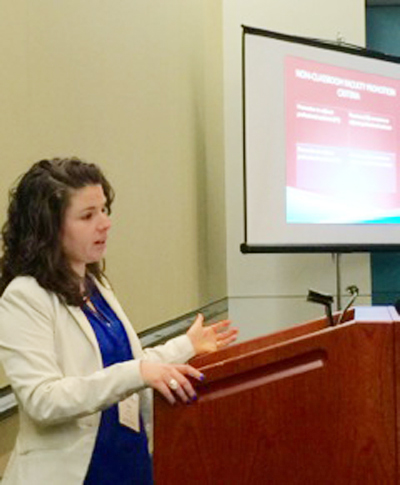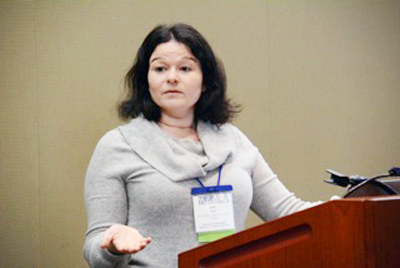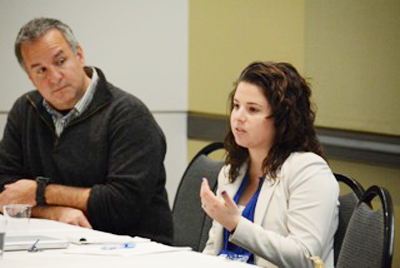April 2016
"I value the academic freedom clause in our contract because I think about my teaching approaches that may be viewed by some as less-than-traditional when I have students thinking critically, synthesizing information, conducting research, etc. It calms my anxiety as I consider my own security as an instructor doing something I truly love." This quote by Katelynn DeLuca (English) captures how the good work the FA does on behalf of adjunct faculty was recently celebrated at a discipline-based conference. On Saturday, March 19, in Hartford, CT, at the Northeast Modern Language Association (NeMLA) Conference, two FA activists addressed union issues for contingent faculty: DeLuca as a presenter and Dr. Emily Lauer (English) as panel moderator [biographies below]. As president of NeMLA's Contingent/Adjunct/Independent Scholar/Two-Year (CAITY) Caucus, Lauer organized the panel, and the following summarizes their good work in representing the FA. Lauer: The CAITY Caucus represents and advocates for contingent and adjunct faculty, independent scholars and faculty at two-year institutions. This special event was born out of discussions at last year’s conference caucus meeting. This idea was to address the timely issue of adjuncts unionizing, with two speakers, both adjunct faculty, in very different union situations: one with a decades-old union representing both part-time faculty and full-time tenure-track faculty and one with a brand new union he helped along that includes only non tenure-track faculty. Originally this panel had included two individuals associated with a part-time faculty union bargaining committee, SEIU Local 200, which is currently seeking to unionize only part-time adjuncts at Ithaca College. Neither of them could present, however: one had to cancel for a job reason and the other had to cancel for a health reason, and I feel that their absence is pretty poignant in this discussion of precarity.
DeLuca: Absolutely, and the opposite of precarity is security. They probably could have presented if they had job security. You know, as a child of working class parents, I first recognized the importance of unions when my mother began working as a bus driver for our local school district. Not only was she afforded the necessary representation and protections because of her union but she was also contracted to receive equal pay in comparison to her male colleagues. As the primary earner for our family since my father had developed multiple sclerosis, my mother was able to provide the basic necessities and have some security, knowing that her contract was in place and fought for by the union. Lauer: The irony is that it can be a challenge to fight for such security and stability when you don't yet have such security and stability. One of the original presenters had emailed me that she hopes that as a result of this discussion more adjuncts will feel "capable and inspired to unionize and/or get more involved in their union." I think a lot of people already feel inspired; it’s arranging our limited resources to help each other feel capable that we need to work on. DeLuca: Though my support for the union has always been present, my involvement in the FA increased significantly last year after being elected to the position of Executive Council representative for college-wide English adjuncts. Having this opportunity—and responsibility—to be the eyes and ears of the FA, I can easily report to the union anything I observe or hear that seems noteworthy. This reminds me that I am a valued and valuable member of the college community. I think it's precisely because we have both full- and part-time faculty in the same union that we feel so capable to accomplish what we do. There really is strength in numbers. Emily: What else do you see as the benefit of having a union like ours?
DeLuca: Preparing for the CAITY presentation, I focused on three major benefits that truly mean a great deal to me.
Lauer: I agree and I'd like to add a couple thoughts. One is a call for transparency: discussions about our working conditions and those of our colleagues are vital to ameliorating crappy situations. Let’s all keep talking to each other and to our various coworkers at our institution and at other institutions about what’s good, what’s bad, what has worked where. One way to do some of that might be to get involved in the caucuses of our disciplinary organizations that focus on labor and working conditions—and get involved in our union! Katelynn DeLuca, adjunct instructor of English and a professional assistant in the Ammerman and Eastern writing centers, is a Ph.D. candidate in the St. John's University department of English with a focus on composition where she regularly teaches and tutors. She has recently presented at NeMLA, the Conference on College Composition and Communication, the national MLA Conference and the College English Association and will present in July at the Conference on Writing Program Administration. She currently has an article under review for an edited collection. Katie serves as the FA's elected Executive Council representative for adjuncts in English. Her scholarly work has included articles for the journals Transformations and Textual Cultures as well as a chapter in the book Brave New Teenagers, which won the Children's Literature Edited Book Award for the year of its publication, 2013. |



